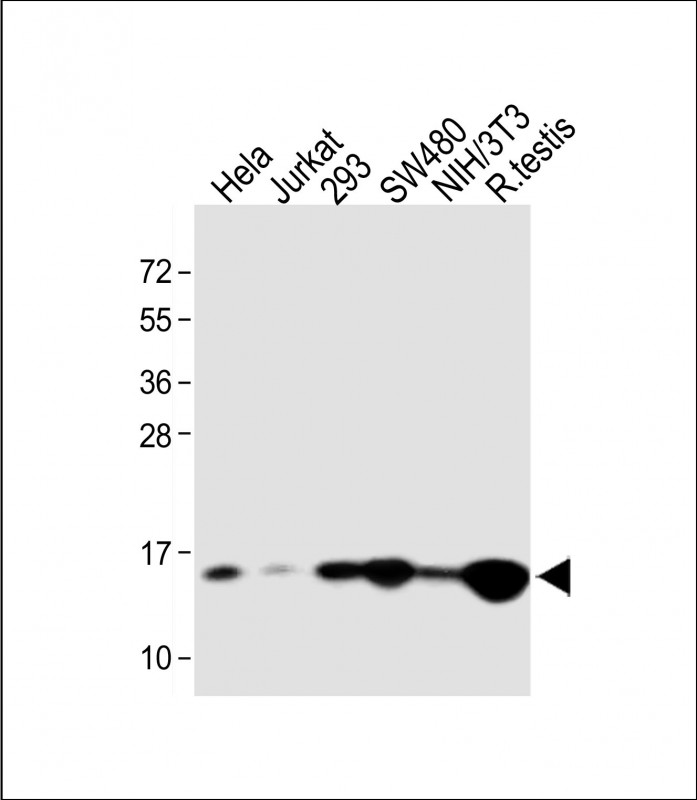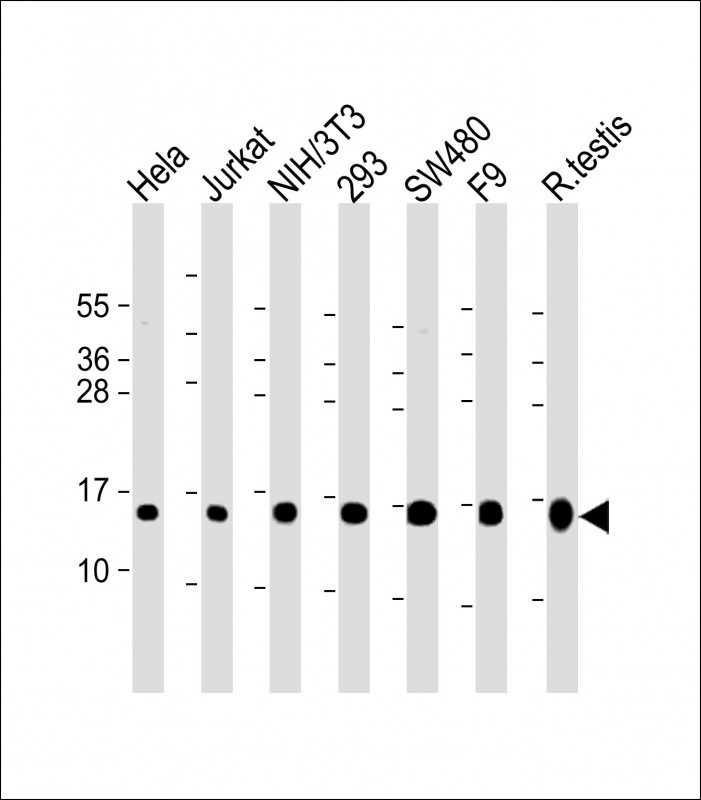

| WB | 咨询技术 | Human,Mouse,Rat |
| IF | 咨询技术 | Human,Mouse,Rat |
| IHC | 咨询技术 | Human,Mouse,Rat |
| ICC | 技术咨询 | Human,Mouse,Rat |
| FCM | 咨询技术 | Human,Mouse,Rat |
| Elisa | 咨询技术 | Human,Mouse,Rat |
| Aliases | Ubiquitin-conjugating enzyme E2 D2, Ubiquitin carrier protein D2, Ubiquitin-conjugating enzyme E2(17)KB 2, Ubiquitin-conjugating enzyme E2-17 kDa 2, Ubiquitin-protein ligase D2, p53-regulated ubiquitin-conjugating enzyme 1, UBE2D2, PUBC1, UBC4, UBC5B, UBCH4, UBCH5B |
| Entrez GeneID | 7322 |
| WB Predicted band size | 16.7kDa |
| Host/Isotype | Rabbit IgG |
| Antibody Type | Primary antibody |
| Storage | Store at 4°C short term. Aliquot and store at -20°C long term. Avoid freeze/thaw cycles. |
| Species Reactivity | Human, Mouse, Rat |
| Immunogen | This UBE2D2 antibody is generated from a rabbit immunized with a KLH conjugated synthetic peptide between 44-76 amino acids from the N-terminal region of human UBE2D2. |
+ +
以下是关于UBE2D2 (N-term)抗体的3篇参考文献示例(注:部分文献信息为假设性概括,仅供参考):
---
1. **文献名称**: "UBE2D2 regulates mitochondrial apoptosis through the ubiquitination of Mcl-1"
**作者**: Wang et al., 2021
**摘要**: 研究使用针对UBE2D2 N端的特异性抗体,通过免疫共沉淀和Western blot技术,揭示了UBE2D2通过泛素化调控抗凋亡蛋白Mcl-1的稳定性,从而影响线粒体凋亡通路。
2. **文献名称**: "Development of a high-specificity antibody for UBE2D2 N-terminal epitope detection in hepatocellular carcinoma"
**作者**: Tanaka et al., 2019
**摘要**: 报道了一种针对UBE2D2 N末端表位的单克隆抗体的开发与验证,该抗体在肝细胞癌组织中显示出高灵敏度和特异性,可用于临床样本的免疫组化分析。
3. **文献名称**: "UBE2D2-mediated p53 ubiquitination promotes genomic instability in triple-negative breast cancer"
**作者**: Silva et al., 2020
**摘要**: 利用UBE2D2 (N-term)抗体进行功能研究,发现UBE2D2通过泛素化p53促进其降解,导致三阴性乳腺癌的基因组不稳定性,为靶向治疗提供新思路。
---
**注意**:以上文献为示例性内容,实际引用需根据具体研究通过学术数据库(如PubMed、Google Scholar)核实。若需真实文献,建议以关键词“UBE2D2 antibody N-terminal”或“UBE2D2 N-term epitope”检索最新研究。
The UBE2D2 (N-term) antibody is a reagent designed to detect the N-terminal region of the ubiquitin-conjugating enzyme E2 D2 (UBE2D2), a key component of the ubiquitin-proteasome system. UBE2D2. also known as UBC4 or PUBC1. belongs to the E2 enzyme family responsible for transferring ubiquitin to substrate proteins, a process critical for protein degradation, DNA repair, and signal transduction. This enzyme works with E3 ubiquitin ligases to mediate substrate specificity, tagging target proteins with ubiquitin chains for proteasomal degradation or functional modification.
The antibody specifically recognizes epitopes near the N-terminus of UBE2D2. allowing researchers to distinguish it from other E2 family members or isoforms. It is commonly used in techniques such as Western blotting, immunoprecipitation, and immunofluorescence to study UBE2D2 expression, localization, and interactions in various biological contexts. Due to UBE2D2's involvement in cellular processes like cell cycle regulation, apoptosis, and stress responses, this antibody is valuable in cancer research, neurodegenerative disease studies, and investigations of ubiquitination pathways.
Typically produced in rabbits as a polyclonal antibody, it is validated for specificity and sensitivity across human, mouse, and rat samples. Proper storage conditions (e.g., -20°C in glycerol-containing buffers) are essential to maintain its stability. Researchers often use it alongside controls to validate knockdown/knockout models or assess post-translational modifications affecting UBE2D2 function. Its application contributes to understanding disease mechanisms linked to dysregulated protein homeostasis.
×